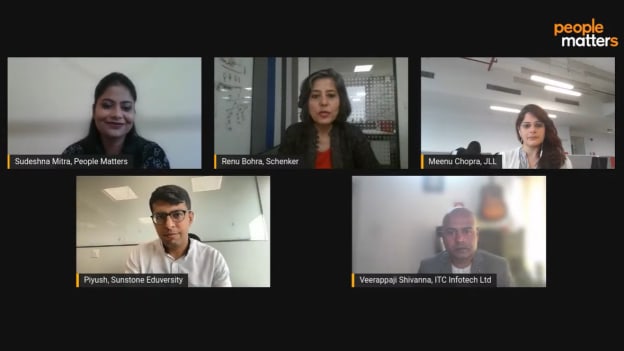The need for industry-academia partnerships to hire quality fresher talent

Building a future-ready workforce might be easier said than done, considering how 42% of core skills are set to change alongside job demands, new data from the World Economic Forum revealed. This scenario is prompting organisations to take a closer look at their skill gaps, in order to 'future-proof' themselves against any and all potential disruptions in the talent economy. With industry-academia collaboration taking centre stage in closing skill gaps through acquiring the best of fresher talent, the current priority of organisations that would best serve their business interests is to find not just a future ready workforce but a company ready workforce through the process.
People Matters, in partnership with Sunstone Eduversity, recently hosted a webcast to bring to light innovative hiring solutions as part of an ongoing series of Talent Talks. This discussion delved into building partnerships that can bring in the skilled entry-level workforce that companies seek by discussing significant challenges and solutions to accelerate and elevate the recruitment agenda.
Leaders who joined the conversation included Renu Bohra, CHRO, DB Schenker; Meenu Chopra, TA Lead (Director), JLL; Veerappaji Shivanna, Head - Campus Recruitment, ITC Infotech; and Piyush Nangru, Co-Founder and COO, Sunstone Eduversity. Here are some key takeaways from the session.
Challenges to overcome when hiring entry-level talent:
'The perennial problem that the industry is facing is how do we get candidates, particularly freshers, to join the organisation and become immediately available for their products. To build the ability of a particular candidate becomes extremely important. That's the critical factor that drives all other decisions, from which institution I should choose, to what assessment metrics I need. How do I ensure that I have customised, ready talent for the business units of my organisation?' shares Veerappaji Shivanna, Head - Campus Recruitment, ITC Infotech.
Renu Bohra, CHRO, DB Schenker, raises the challenge of choosing and sourcing talent from the wide array of institutions operating across the country.
Tie-ups have to take place with a number of institutes across locations. For this reason, having the right connections and building up a database of campus partners becomes imperative.
In line with Bohra, Piyush Nangru, Co-Founder and COO, Sunstone Eduversity also raises the concern of hiring recruits across multiple locations and expecting them to have the same skill sets. However, the quality of hires vary depending on the institute and location. This is why organisations need to invest in training freshers. Moreover, these training modules need to be standardised across different campuses so that there is consistency in graduates hired from different parts of the country. This will especially benefit the HR especially when the modules are customised in line with the needs of the partnered organisation.
In this discussion around the challenges of campus hiring, Meenu Chopra, TA Lead (Director), JLL highlights the importance of creating career paths and being particular about the knowledge management process. This is crucial when it comes to onboarding recruits and enabling them to gain clarity on their role, the company vision and more.
Skills in demand across organisations:
The right mix of hard and soft skills is what recruiters actively seek when carrying out assessments, Chopra pointed out, simultaneously emphasising cultural alignment.
While organisations do indeed require talent who are ready to work from day one, they must at the same time be prepared to handhold their recruits and carve out career paths for them to grow in the company. An interesting point raised by Shivanna when talking about hard and soft skills is how the latter is context-sensitive while the former isn't. As a result, soft skills testing should be a critical part of talent assessments. While hard skills will tell you how efficient your recruits would be when they run into challenges in the workplace, soft skills will inform you of how they will thrive in the company, based on attributes such as their flexibility, resilience and adaptability.
Meeting the skills demand and overcoming campus hiring challenges:
'With the way our conventional education system is structured, it is not best suited to address the rapidly evolving workplace environment. I'm really glad to hear most of the panellists here are working back into universities, in some way or the other, to inject training modules, which is useful and the need of the hour. I truly believe the solution here has to be some sort of industry-academia partnership where programs can be co-created. There needs to be real-life simulation-based programs, which give the actual flavour of what is going to be expected on the job,’ advises Nangru.
Such programs can help develop a talent pipeline that is ready to take on workplace challenges. Sunstone Eduversity works closely with campuses – with a presence in over 27+ campuses– which incorporate training modules and use cases. These lessons are carried out in classrooms for students to become industry-ready.
Talent development strategies can also be customised based on the skill sets that leaders seek. Campus hiring options accordingly have to be targeted, and the process of talent sourcing and screening must begin early. Even building connections with the right professors can go a long way towards developing the talent pipeline.
Shivanna points out that – with talent market dynamics changing – seasonal talent scouting will not be the solution. What employers need is a talent supply chain throughout the year to widen the talent pool. They must also offer more flexible opportunities for students to learn while pursuing their studies and this will also be fundamental in developing a talent pipeline early on.
Opportunities abound in the hunt for highly-skilled talent through campus hiring. It is evident that the talent market will be increasingly candidate driven but at the same time, it will also be skill driven. For companies and students alike, the right set of qualifications will make it or break it for them in the recruitment landscape. Which is why it becomes imperative to invest your time in the right campus that on the one hand will equip you with future ready skills and on the other hand will equip you with a future ready workforce. The competition for hiring and getting hired is at an all time high. Organisations must elevate their hiring strategy by collaborating with campuses to widen their talent pools and solve recruitment challenges to stay ahead of the game. Learn more actionable insights from this webcast.











